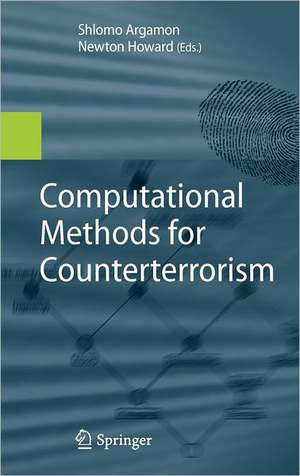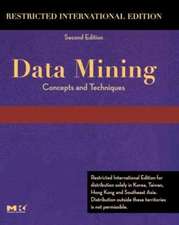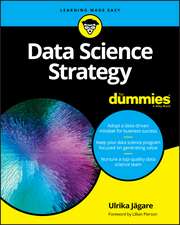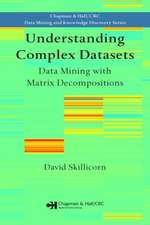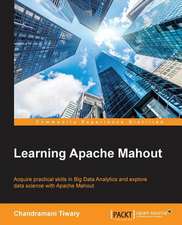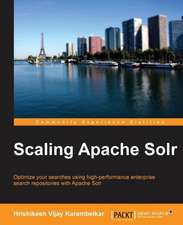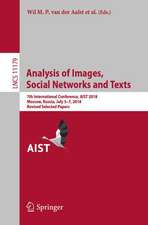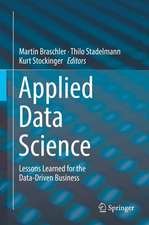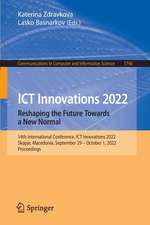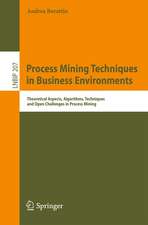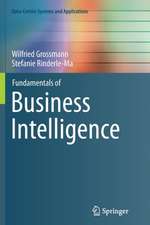Computational Methods for Counterterrorism
Editat de Shlomo Argamon, Newton Howarden Limba Engleză Hardback – 15 iul 2009
This book collects a wide range of the most current computational research that addresses critical issues for countering terrorism, including:
- Finding, summarizing, and evaluating relevant information from large and changing data stores;
- Simulating and predicting enemy acts and outcomes; and
- Producing actionable intelligence by finding meaningful patterns hidden in huge amounts of noisy data.
The research described in this book is invaluable reading for governmental decision-makers designing new policies to counter terrorist threats, for members of the military, intelligence, and law enforcement communities devising counterterrorism strategies, and for researchers developing more effective methods for knowledge discovery in complicated and diverse datasets.
| Toate formatele și edițiile | Preț | Express |
|---|---|---|
| Paperback (1) | 646.95 lei 6-8 săpt. | |
| Springer Berlin, Heidelberg – 26 noi 2014 | 646.95 lei 6-8 săpt. | |
| Hardback (1) | 615.69 lei 38-45 zile | |
| Springer Berlin, Heidelberg – 15 iul 2009 | 615.69 lei 38-45 zile |
Preț: 615.69 lei
Preț vechi: 769.61 lei
-20% Nou
Puncte Express: 924
Preț estimativ în valută:
117.81€ • 123.00$ • 97.50£
117.81€ • 123.00$ • 97.50£
Carte tipărită la comandă
Livrare economică 31 martie-07 aprilie
Preluare comenzi: 021 569.72.76
Specificații
ISBN-13: 9783642011405
ISBN-10: 3642011403
Pagini: 326
Ilustrații: XVIII, 306 p.
Dimensiuni: 155 x 235 x 24 mm
Greutate: 0.73 kg
Ediția:2009
Editura: Springer Berlin, Heidelberg
Colecția Springer
Locul publicării:Berlin, Heidelberg, Germany
ISBN-10: 3642011403
Pagini: 326
Ilustrații: XVIII, 306 p.
Dimensiuni: 155 x 235 x 24 mm
Greutate: 0.73 kg
Ediția:2009
Editura: Springer Berlin, Heidelberg
Colecția Springer
Locul publicării:Berlin, Heidelberg, Germany
Public țintă
ResearchCuprins
I Information Access.- On Searching in the #x201C;Real World#x201D;.- Signature-Based Retrieval of Scanned Documents Using Conditional Random Fields.- What Makes a Good Summary?.- A Prototype Search Toolkit.- II Text Analysis.- Unapparent Information Revelation: Text Mining for Counterterrorism.- Identification of Information.- Rich Language Analysis for Counterterrorism.- III Graphical Models.- Dicliques: Finding Needles in Haystacks.- Information Superiority via Formal Concept Analysis.- Reflexive Analysis of Groups.- Evaluating Self-Reflexion Analysis Using Repertory Grids.- IV Conflict Analysis.- Anticipating Terrorist Safe Havens from Instability Induced Conflict.- Applied Counterfactual Reasoning.- Adversarial Planning in Networks.- Gaming and Simulating Ethno-Political Conflicts.
Notă biografică
Shlomo Argamon is Associate Professor of Computer Science at the Illinois Institute of Technology, Chicago, IL, USA, since 2002. Prior to that, he had held academic positions at Bar-Ilan University, where he held a Fulbright Postdoctoral Fellowship (1994-96), and at the Jerusalem College of Technology. Dr. Argamon received his B.S. (1988) in Applied Mathematics from Carnegie-Mellon University, and his M.Phil. (1991) and Ph.D. (1994) in Computer Science from Yale University, where he was a Hertz Foundation Fellow. His current research interests lie mainly in the use of machine learning methods to aid in functional analysis of natural language, with particular focus on questions of style. During his career, Dr. Argamon has worked on a variety of problems in experimental machine learning, including robotic map-learning, theory revision, and natural language processing, and has published numerous research papers in these areas.
Textul de pe ultima copertă
Modern terrorist networks pose an unprecedented threat to international security. Their fluid and non-hierarchical structures, their religious and ideological motivations, and their predominantly non-territorial objectives all radically complicate the question of how to neutralize them. As governments and militaries work to devise new policies and doctrines to combat terror, new technologies are desperately needed to make these efforts effective.
This book collects a wide range of the most current computational research addressing critical issues for counterterrorism in a dynamic and complex threat environment:
The models and methods discussed in this book are invaluable reading for governmental decision-makers designing new policies to counter terrorist threats, for members of the military, intelligence, and law enforcement communities devising counterterrorism strategiesbased on new technologies, and for academic and industrial researchers devising more effective methods for knowledge discovery in complicated and diverse datasets.
This book collects a wide range of the most current computational research addressing critical issues for counterterrorism in a dynamic and complex threat environment:
- finding, summarizing, and evaluating relevant information from large and dynamic data stores;
- simulation and prediction of likely enemy actions and the effects of proposed counter-efforts; and
- producing actionable intelligence by finding meaningful patterns hidden in masses of noisy data items.
The models and methods discussed in this book are invaluable reading for governmental decision-makers designing new policies to counter terrorist threats, for members of the military, intelligence, and law enforcement communities devising counterterrorism strategiesbased on new technologies, and for academic and industrial researchers devising more effective methods for knowledge discovery in complicated and diverse datasets.
Caracteristici
Includes supplementary material: sn.pub/extras
